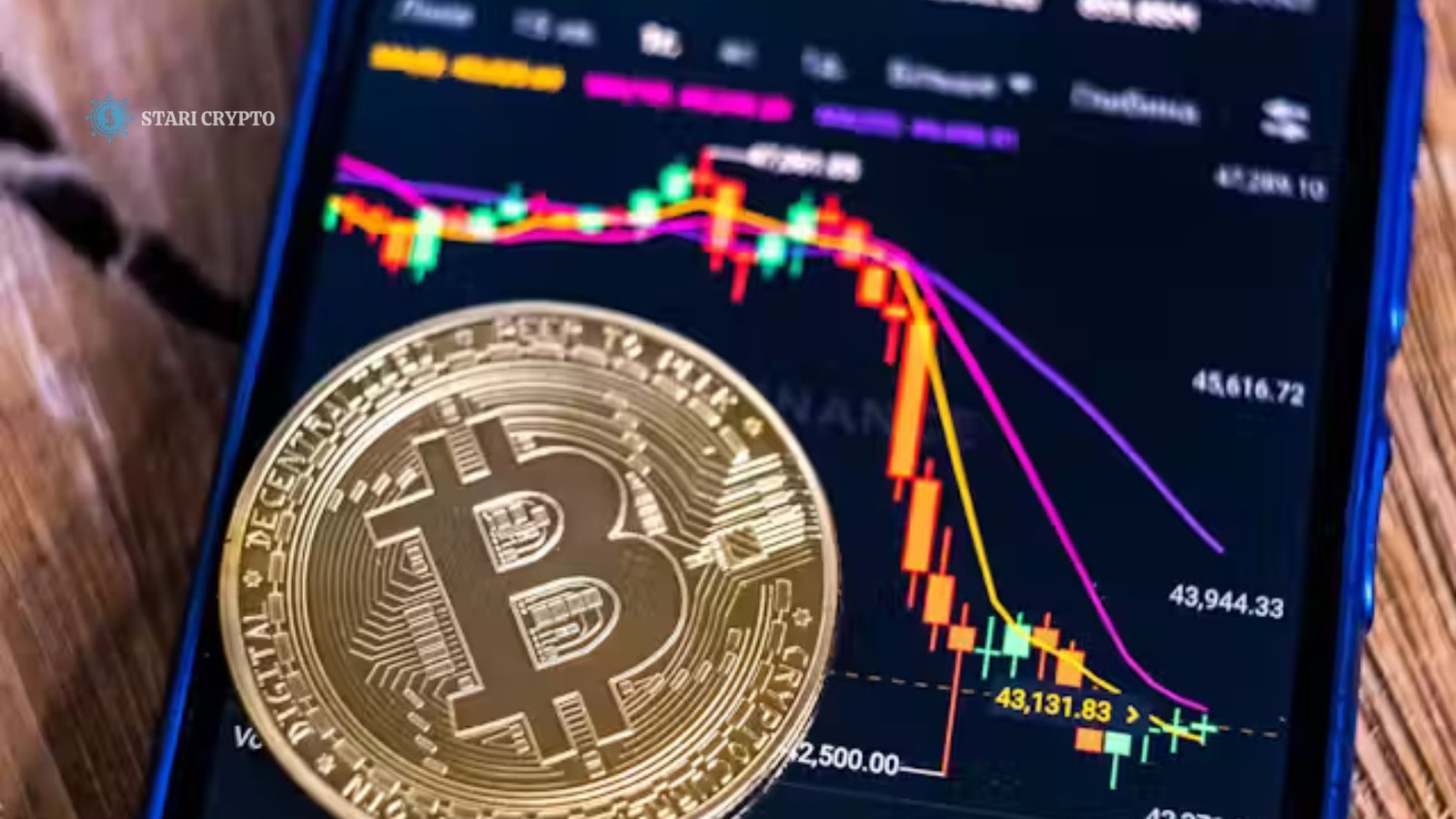Bitcoin Market Crash News: Bitcoin and the cryptocurrency business are notoriously volatile. Bitcoin prices can spike and drop instantly. The market can crash for any number of reasons, including regulatory news and economic conditions, terrifying investors and speculators. Even though Bitcoin collapses are nothing new, it’s important to understand their causes, effects, and responses to manage the volatile cryptocurrency market. This essay discusses how investors can stay informed and manage their investments during market volatility, as well as the key reasons for the Bitcoin market collapse and their effects on the crypto market.
Recent Bitcoin Market Crash: Why?
There is a lengthy history of strong corrections in the bitcoin market, the most recent of which is the recent drop. In April of 2021, Bitcoin’s price hit an all-time high of almost $64,000 before plunging to a low of about $30,000 in May. As a result of growing inflation and interest rate hikes, among other macroeconomic factors, investor sentiment was dampened in 2022, and Bitcoin’s value fell below $20,000 once again. But why do these crashes happen? Market mood, regulatory news, and macroeconomic conditions are some of the elements that frequently influence this.
Key Factors Behind Bitcoin Market Crashes
Crackdowns by regulators, pessimism in the market, and larger macroeconomic issues like inflation and interest rate hikes are major causes of Bitcoin market crashes. A number of circumstances cause sharp price decreases. These include speculative trading, technical concerns like network congestion, and massive sell-offs by institutional investors, also known as “whales.”
 Regulatory Crackdowns
Regulatory Crackdowns
Some governments and regulatory organizations welcome cryptocurrencies, while others regulate or ban them. In 2021, China banned cryptocurrency trade and mining, causing Bitcoin’s price to plummet. Investors reacted to regulatory pressure with large sell-offs due to FUD. Other governments have restricted cryptocurrency use to address money laundering, tax evasion, and mining pollution. Such news often panics investors, causing Bitcoin’s price to plummet.
Market Sentiment
The bitcoin market is sentiment-driven. Positive news can generate buying sprees, while negative news can cause panic selling. High volatility makes Bitcoin vulnerable to big market fluctuations. When major investors, or “whales,” sell their Bitcoin holdings, smaller investors generally follow, fearing more losses. Hacks, technical issues, and Elon Musk tweets can trigger price swings. Musk’s May 2021 declaration that Tesla would no longer take Bitcoin owing to environmental concerns caused a significant sell-off and market crash.
Macroeconomic Factors
The economy was also affected by Bitcoin market crashes. Central banks often raise interest rates to combat inflation, which reduces market liquidity. When liquidity tightens, speculative assets like Bitcoin fall in price. Political upheaval, pandemics, and financial crises can potentially hurt the Bitcoin industry. Bitcoin initially fell during the COVID-19 pandemic, but it rose as investors sought alternative assets in response to government support. Bitcoin fell again in 2022 as inflation rose and central banks raised interest rates, indicating that macroeconomic considerations always have a role.
Speculative Trading
A large portion of the Bitcoin market is occupied by speculators who purchase and sell coins primarily on the expectation of short-term price fluctuations rather than their intrinsic value. When prices surge fast due to enthusiasm and FOMO (Fear of Missing Out), a speculative bubble forms; yet, when the bubble collapses, prices can fall just as fast. The precipitating factor for these unexpected price drops may be anything from a heavy sell-off to news that causes investors to lose faith, including unfavourable regulatory updates or manipulation of the market.
Technological Issues and Network Congestion
If there are any technical issues with the Bitcoin network, it could cause the market to crash. For example, when there are a lot of Bitcoin transactions, the network might get crowded, which means that transactions take longer and cost more. Users are irritated, and investors are scared, which leads to a decrease in price due to sell-offs. Hard forks or security holes in the Bitcoin network are examples of technical issues that could cause investors to lose faith in the cryptocurrency and cause its price to plummet.
The Impact of a Bitcoin Market Crash
Market downturns in Bitcoin have far-reaching effects on the cryptocurrency industry as a whole, not just on the price of Bitcoin itself. As the market leader, Bitcoin’s price tends to follow the trends of other major cryptocurrencies such as Ethereum, Ripple, and Litecoin. As a whole, the market tends to fall as Bitcoin’s value drops.

In addition, investors may experience psychological fallout from such disasters. If you’re a novice or unskilled investor, you can lose money selling your assets during a downturn, only to see them recoup later. However, experienced investors who have faith in Bitcoin’s long-term potential typically see breakdowns as opportunities to buy. In addition to teaching us about the need of risk management and keeping ourselves informed about the factors impacting BBitcoin’sprice, crashes teach us about market volatility.
Also Read: Bitcoin vs. Traditional Assets: Why buy Bitcoin instead of stocks?
In Summary
While they may be unnerving, market crashes are inevitable in the lifetime of cryptocurrencies like Bitcoin. Better portfolio management during volatile times is possible if investors have a firm grasp of the reasons for these crashes, which can include anything from regulatory pressures to speculative trading and macroeconomic issues. Crashing stock prices may mark the beginning of the end for some, but seasoned investors often view these events as merely temporary setbacks—or even opportunities—for future gains.
If investors keep themselves educated, diversify their holdings, and keep a long-term view, they will be better able to handle the unpredictable Bitcoin market. Everyone involved in the volatile cryptocurrency industry, from novice investors to seasoned traders, must be ready for market crashes.
FAQs
1. Why does BBitcoin’sprice fluctuate so much?
BBitcoin’sprice is highly volatile due to a variety of factors, including supply and demand, market sentiment, regulatory news, and macroeconomic conditions. Additionally, speculative trading and the relatively low liquidity of the Bitcoin market contribute to rapid price changes.
2. What should I do during a Bitcoin market crash?
During a Bitcoin market crash, it’s important to remain calm and avoid making impulsive decisions. Evaluate whether the factors causing the crash are temporary or have long-term implications for BBitcoin’svalue. If you believe in BBitcoin’slong-term potential, it might be an opportunity to buy at a lower price. Always have a strategy and consider setting stop-losses to manage your risk.
3. Can a Bitcoin crash affect other cryptocurrencies?
Yes, Bitcoin is the leading cryptocurrency by market capitalization, and its price movements often influence the broader crypto market. When Bitcoin experiences a significant crash, other cryptocurrencies typically follow, as investor sentiment in the overall market declines.
4. How can I protect my investments during a Bitcoin crash?
To protect your investments during a Bitcoin crash, diversify your portfolio by investing in other assets such as stocks, bonds, or stablecoins. This reduces your exposure to BBitcoin’svolatility. Additionally, consider using risk management tools like stop-loss orders to automatically sell your assets if they fall below a certain price.
5. Will Bitcoin recover after a crash?
Historically, Bitcoin has recovered after significant crashes, sometimes reaching new all-time highs. However, the recovery timeline can vary depending on the factors that triggered the crash. While Bitcoin has demonstrated resilience in the past, future recoveries are not guaranteed, and iit’scrucial to monitor market conditions and developments closely.


















